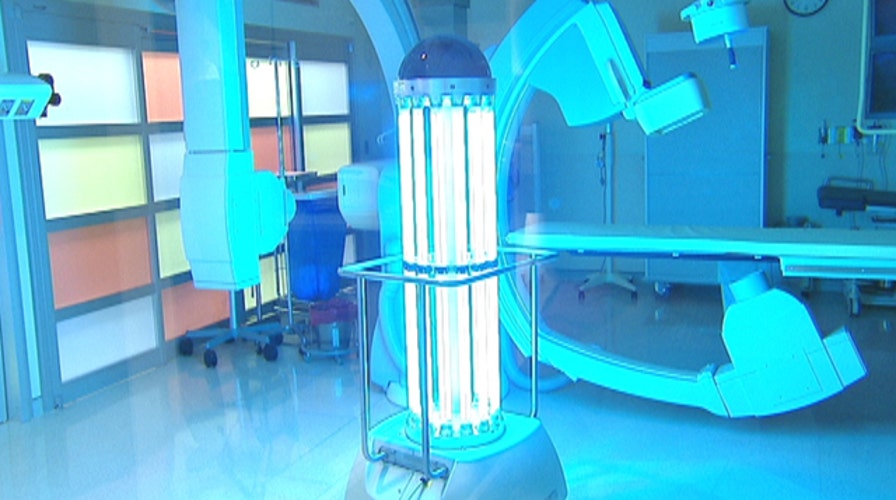Disinfecting robot zaps superbugs
A new breakthrough in superbug-fighting technology is helping lower infection rates in hospitals nationwide. We spoke with Robert Wood Johnson University Hospital in New Brunswick, NJ to find out how the TRU-D robot is helping ensure patient safety
MONROVIA, Liberia – In two layers of protective gear in humid equatorial heat, the doctor slowly picks his way through the packed ETU – Ebola Treatment Unit -- in one of the main hospitals in Monrovia, Liberia. It’s so full of patients that many are having to lie on the floor. The doctor treads warily: If he trips, his protective suit might rip, exposing him to the deadly virus.
“This thing is out of control; it could potentially de-populate huge sections of the country,” the American doctor, who asked not to be named, told FoxNews.com hours later. “All of the ETUs are at or beyond capacity.”
With the infectious disease ravaging Liberia’s capital, nurses and doctors are in short supply. The World Health Organization says more than 170 have died from the disease, while those who continue the battle face infected facilities and patients who hide their symptoms.
“[Victims] are in denial,” a West African hygienist working at the same facility, JFK Hospital, said. “People ask us to help them, they say they have a cold, they say it’s not necessary to wear special clothing, they deny it is Ebola. We have lost our families, our friends. They are infecting our nurses, our doctors – they are all gone.”
[pullquote]
Stepping into this dangerous scene of misery with a message of hope is another U.S. doctor, tropical diseases specialist Jeff Deal. The key to his strategy is to make it safe to treat patients, and his weapon of choice is a pair of 5-foot high, germ-zapping devices called the Tru-D Smart UVC.
Deal, a devout Christian who took a leave from his job as director of anthropology and water studies for the Center for Global Health at the Medical University of South Carolina and paid his own way to this impoverished nation, persuaded the Memphis-based manufacturer of the machine to donate and ship two of the machines with him.
Emanating UVC light at a particular frequency known to kill Ebola particles, the machine looks like something from Star Wars. With so many health care workers and patients becoming infected inside ETUs, Deal knew he had to get his decontamination system installed in the isolation wards -- Ground Zero for the epidemic.
“I feel like in a lot of ways we had no choice, we had to come,” he said. “I wish I had hundreds and hundreds of these to deploy.”
In recent days, Deal has supervised one of these ultimate bug-slaying devices being installed in each of Monrovia’s two main ETUs. He laughed as he described the moment when, while wearing his protective suit, he turned the first machine on.
“I was so excited I could hardly stay in my suit,” Deal said. “To see this device be used in a place like this, where it’s so needed, is like a dream come true. It’s a very special time, I’ll remember that forever.”
One of the machines is now up and running at Monrovia's Elwa hospital, in the very ward where Dr. Kent Brantly and Nancy Writebol got infected. Both were airlifted to Atlanta for treatment and are recovering.
At that hospital, people who are suspected of being infected are observed in an isolation ward for up to three days while doctors await lab results. One doctor said people are so crammed in next to each other that, “if you don’t have Ebola when you go in there, chances are that you will have it by the time you come out.”
Yet another American doctor is visiting Monrovia’s beleaguered hospitals -- U.S. Centers for Disease Control and Prevention Director Dr. Thomas Frieden.
“Every new transmission that occurs increases the risk to the community, the region and the world,” Frieden, wearing a protective suit, told FoxNews.com. “This is a crisis which will continue to spiral out of control in Liberia unless the world comes together to respond in an unprecedented way.”
At a crematorium in Monrovia, Frieden watched recently as bodies of Ebola victims found lying in the capital’s streets were incinerated.
Despite the grim situation, Deal remains an optimist. He told of meeting a teenage boy and a nurse earlier this week, deep inside an Ebola ward, both without protective clothing. The nurse in uniform, attending to patients with a smile on her face, the boy just in shorts – and a mask, busy scrubbing mattresses.
Both had survived Ebola, are now immune and want to help others. Their selflessness touched him.
“One of the things that this tells me is that there is hope, these recovering patients tell me that this is not a hopeless disease,” Deal said. “It can be managed and patients can do quite well.”
Paul Tilsley is a freelance TV and Radio correspondent for Fox News, based out of Johannesburg, South Africa. Follow him on Twitter @paultilsley

